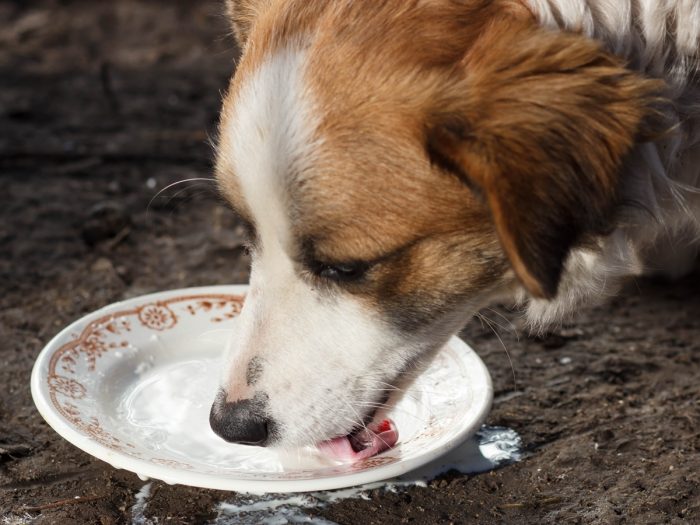When dogs drink milk, it often makes pet owners nervous, as does the consumption of most human food. Before giving your dog any human food, including milk, it is very important to understand the potential risks to your pet.
Can Dogs Drink Milk?
For most dogs, there is no danger to drinking milk, and they will be able to digest it quite normally. That being said, for many other dogs, drinking milk or consuming dairy products is much less pleasant, because it results in unpleasant gastrointestinal side effects. Yes, just like humans, some dogs do suffer from lactose intolerance – the inability of the body to break down lactose, due to the lack of an enzyme called lactase. For these dogs, drinking milk is not a serious health risk, but it can result in nausea, vomiting, loose stools or diarrhea. [1]
For dogs that do not suffer from lactose intolerance, milk can actually be a very healthy addition to their diet. Milk is rich in vitamin A, vitamin B12, vitamin C, and folate, as well as vitamin E, and D. Many of these are beneficial for your dog’s immune system and bone strength, but a normal canine diet should provide a balanced intake of these key nutrients. Human food, like milk, should only be given in moderation, as an occasional treat.
When it comes to other types of milk, such as almond, soy or coconut milk, dogs don’t typically show any adverse reactions, unless they have a specific food allergy. As with regular cow or goat’s milk, they should only be given to your pooch in small amounts.

Dogs can drink milk, depending on how they handle a specific nutrient found in milk. It may differ from one dog to another. Photo Credit: Shutterstock
Can Dogs become Lactose Intolerant?
When dogs are born, they suckle on their mother and drink the milk, because puppies have a high level of lactase in their bodies. This allows them to break the lactose in their mother’s milk into easily digestible sugars. However, as dogs are weaned off of their mother’s milk, there is a diminished need for lactase, and the concentration of that enzyme drops. [2]
For this reason, many dogs will become lactose intolerant over time, while others will retain enough of the necessary enzyme to properly metabolize and digest milk. Without lactase, the lactose will remain undigested and pass into the colon, causing the symptoms of lactose intolerance, such as bloating, cramping, flatulence, and diarrhea. There is no way of knowing how your pet’s system will respond after drinking milk. Some dogs are lactose intolerant from birth, but this is far less common than the condition developing over time. [3]
How much Milk can Dogs drink?
Not only does lactose intolerance cause stomach discomfort in dogs, but the high levels of fat found in whole milk and high-fat dairy products can cause diarrhea and vomiting in some dogs. Therefore, regardless of whether your dog has lactose intolerance, they should never drink a large amount of milk. If your dog snags a piece of cheese or licks a bit of milk from your empty cereal bowl, it shouldn’t be a problem, but that should be the limit. [4]
Depending on the size of your dog, the acceptable amount of dairy intake will change, but it generally shouldn’t be added to their diet more than 1-2 times per week. If your dog does consume too much milk, pay close attention to their stomach and bathroom activity for the next 12-16 hours, till the milk gets digested.
